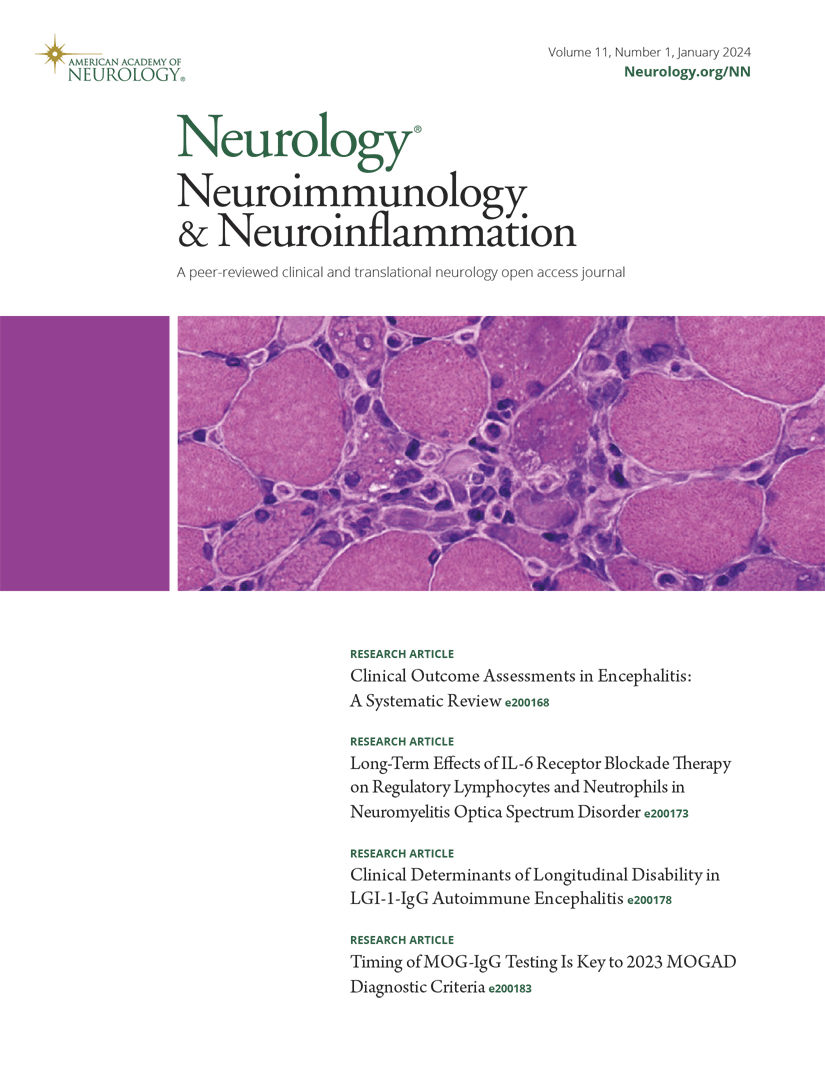用简单的评分(MOG-AR)来识别 MOGAD 攻击后复发风险高的个体。
IF 7.8
1区 医学
Q1 CLINICAL NEUROLOGY
Neurology® Neuroimmunology & Neuroinflammation
Pub Date : 2024-09-09
DOI:10.1212/nxi.0000000000200309
引用次数: 0
摘要
背景和目的:确定髓鞘少突胶质细胞糖蛋白抗体相关疾病(MOGAD)患者复发的预测因素,并开发和验证预测复发的简单风险评分。方法:在中国国家神经炎性疾病登记中心(CNRID),我们从2023年3月开始发现MOGAD患者,并进行前瞻性随访至2023年9月。主要终点是经独立专家组确认的 MOGAD 复发。患者被随机分为模型开发组(75%)和内部验证组(25%)。使用安德森-吉尔模型构建预测模型并进行内部验证。结果共有 188 名患者(包括 612 次治疗)被纳入队列。479,p < 0.001)、口服皮质类固醇 >3 个月(HR 0.449,95% CI 0.326-0.620,p < 0.001)和发病表型(p < 0.001)被确定为与 MOGAD 复发相关的因素。在预测模型中得出的一个名为MOG-AR(免疫抑制疗法、口服皮质类固醇、发病年龄、性别、发作表型)的预测得分显示了对MOGAD复发的强大预测能力。MOG-AR 评分为 13-16 分表明复发风险较高(HR:3.285,95% CI 1.473-7.327,P = 0.004)。有必要进一步验证从该队列中得出的 MOG-AR 评分,以确定适当的治疗和监测频率。试验注册信息CNRID,NCT05154370,2021 年 12 月 13 日注册,2021 年 12 月 15 日首次入组。本文章由计算机程序翻译,如有差异,请以英文原文为准。
A Simple Score (MOG-AR) to Identify Individuals at High Risk of Relapse After MOGAD Attack.
BACKGROUND AND OBJECTIVES
To identify predictors for relapse in patients with myelin oligodendrocyte glycoprotein antibody-associated disease (MOGAD) and to develop and validate a simple risk score for predicting relapse.
METHODS
In China National Registry of Neuro-Inflammatory Diseases (CNRID), we identified patients with MOGAD from March 2023 and followed up prospectively to September 2023. The primary endpoint was MOGAD relapse, confirmed by an independent panel. Patients were randomly divided into model development (75%) and internal validation (25%) cohorts. Prediction models were constructed and internally validated using Andersen-Gill models. Nomogram and relapse risk score were generated based on the final prediction models.
RESULTS
A total of 188 patients (comprising 612 treatment episodes) were included in cohorts. Female (HR: 0.687, 95% CI 0.524-0.899, p = 0.006), onset age 45 years or older (HR: 1.621, 95% CI 1.242-2.116, p < 0.001), immunosuppressive therapy (HR: 0.338, 95% CI 0.239-0.479, p < 0.001), oral corticosteroids >3 months (HR 0.449, 95% CI 0.326-0.620, p < 0.001), and onset phenotype (p < 0.001) were identified as factors associated with MOGAD relapse. A predictive score, termed MOG-AR (Immunosuppressive therapy, oral Corticosteroids, Onset Age, Sex, Attack phenotype), derived in prediction model, demonstrated strong predictive ability for MOGAD relapse. MOG-AR score of 13-16 indicates a higher risk of relapse (HR: 3.285, 95% CI 1.473-7.327, p = 0.004).
DISCUSSION
The risk of MOGAD relapse seems to be predictable. Further validation of MOG-AR score developed from this cohort to determine appropriate treatment and monitoring frequency is warranted.
TRIAL REGISTRATION INFORMATION
CNRID, NCT05154370, registered December 13, 2021, first enrolled December 15, 2021.
求助全文
通过发布文献求助,成功后即可免费获取论文全文。
去求助
来源期刊

Neurology® Neuroimmunology & Neuroinflammation
Neuroscience-Neurology
CiteScore
15.60
自引率
2.30%
发文量
219
审稿时长
8 weeks
期刊介绍:
Neurology Neuroimmunology & Neuroinflammation is an official journal of the American Academy of Neurology. Neurology: Neuroimmunology & Neuroinflammation will be the premier peer-reviewed journal in neuroimmunology and neuroinflammation. This journal publishes rigorously peer-reviewed open-access reports of original research and in-depth reviews of topics in neuroimmunology & neuroinflammation, affecting the full range of neurologic diseases including (but not limited to) Alzheimer's disease, Parkinson's disease, ALS, tauopathy, and stroke; multiple sclerosis and NMO; inflammatory peripheral nerve and muscle disease, Guillain-Barré and myasthenia gravis; nervous system infection; paraneoplastic syndromes, noninfectious encephalitides and other antibody-mediated disorders; and psychiatric and neurodevelopmental disorders. Clinical trials, instructive case reports, and small case series will also be featured.
 求助内容:
求助内容: 应助结果提醒方式:
应助结果提醒方式:


